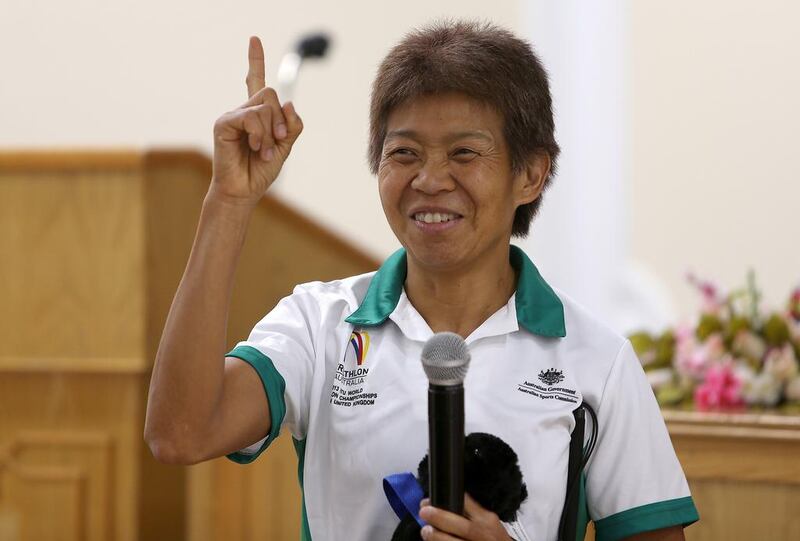SHARJAH // Live your dreams – and make those dreams big.
That was the message from Australian Paralympic gold medallist Lindy Hou to students, coaches and teachers at Al Tiqah Club, a sports group for residents with disabilities.
And it hit its target.
“I don’t have a dream yet. I should think about it,” said Ahmed, 14, a keen swimmer and footballer who has impaired hearing and uses sign language.
“I was amazed at her fast race. I saw it and felt that I too can do anything.”
Hou, 53, began losing her vision in the mid-1980s due to a degenerative eye condition called retinitis pigmentosa.
Now almost totally blind, she visited the UAE this week to inspire schoolchildren, people with special needs, leaders of companies and sportsmen and women.
A short presentation that included a video of Hou cycling to victory at Athens in 2004 was greeted with applause from the more than 80 club members.
She then asked them to shut their eyes and imagine their dream, whether it was playing basketball or becoming a teacher.
“Lindy’s concentration on the dream was very important because it will make people think about their own dreams,” said Sheikha Jameela bint Mohammed Al Qasimi, director general of the Sharjah City for Humanitarian Services and vice president of the Supreme Council for Family Affairs.
“I was surprised at the number of questions they asked. It was an inspirational moment, even for us as grown-ups who have been working in this sector.”
Ahmed’s coach, Salah Odeh, used sign language to pass on Hou’s speech to a group of boys gathered in the club’s auditorium.
“This is important for me because it can help me teach young children,” Mr Odeh said. “I can think of tactics on how to get their interest.”
Club members included UAE athletes in wheelchair sprints, javelin and shot put who have won medals in international competitions.
Hou told club leaders it was crucial to encourage people with different disabilities to take up sports.
“It is not just for those who want to compete at the international level,” she said. “Everyone should give sports a try. It helps to make friends and is great for your body and mind.”
She retired from competitive cycling after winning medals for Australia in two Paralympic Games and several world championships.
Hou now competes in triathlons and recently won a paratriathlon national championship in Australia in the vision-impaired category.
In that event, athletes are connected by a rope to their guides, who swim or run beside them, and in the cycling section they ride a tandem bike.
Students were encouraged by Hou’s assertion that disability was not a barrier.
“We need people like her to explain to the disabled that their dreams can come true,” said Mohammed Abu Zahra, an art teacher. “Disability did not stop her dream. She insisted on dreaming more and this is what we must tell students.”
Abla Al Kaabi, a leader of the Emirates Association for the Blind, who has impaired vision, said Hou’s visit would encourage women with disabilities to take up sport.
“Ladies are sometimes scared to do new things but if they hear new ideas from others it will give them a push,” Ms Al Kaabi said.
“People need new activities and challenges and what we can learn is to be confident, not scared.
“I like that her problem did not stop her but gave her motivation to go on, and this is what I will tell other women.”
rtalwar@thenational.ae







